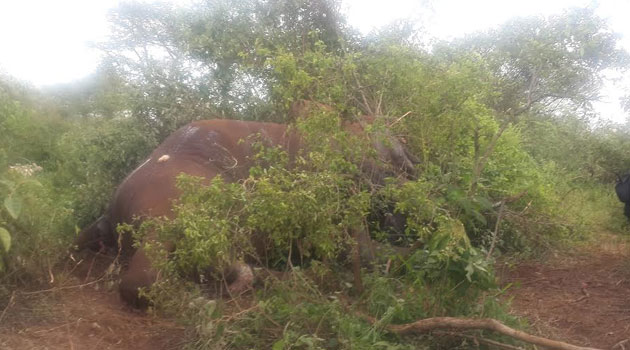
“They are angry that we killed the elephant, all they keep on talking about is the elephant and elephant and elephant, they don’t talk about the death of the person; they don’t care,” Mukuria Kenya, an elder in the community vented/JUDIE KABERIA
NAIROBI, Kenya, Mar 14 – A solemn mood engulfed a small village tucked in the interior of Kiboko in Kajiado County.
Family and neighbours gathered outside the manyatta to come to terms with the death of a three year-old boy who was attacked by an elephant on his way from church last week.
The boy was in the company of his mother and five year old brother when an elephant suddenly charged at them.
“At the corner we saw a herd of elephants. One came running after us, I was holding my brother’s hand, the elephant had already seen us, it ran after us, when I saw it was very near us, I released my brother’s hand and ran,” the five year-old boy recalled.
“The elephant dragged him for a while before it took off.”
The boy was rushed to a hospital where he later died.
The loss was beyond comprehension.
Immediately after the burial, the anger was directed to the elephants which the community referred to as ‘terrorists’.
READ: Kajiado residents demand action over killer elephants
Few metres from the home of the deceased, it was clear the community had accomplished its revenge mission as a carcass lay there after they killed an elephant.
“Killing an elephant is not easy. It is a very big animal. Even when we use poisoned arrows and spears, this animal cannot die that easy,” one of the community members who led us to the area explained.
It took a group of more than 50 people an entire day to kill the elephant.
“We attacked it the whole day, we pierced it with spears. It charged at us. We had to be careful it doesn’t kill any of us. It is a difficult animal. It kept on running in every direction despite the many injuries.”
At Masimba Town, we met a group of elders. Their emotions were highly charged.
Their blame was directed to the Kenya Wildlife Service (KWS) and ‘their’ terrorist animals.
“If you have been sent by KWS we will not care if you are a woman, we will rough you up. We don’t want KWS here,” one of the elders warned.
They complained that KWS values the lives of the elephants more than human beings.
“They are angry that we killed the elephant, all they keep on talking about is the elephant and elephant and elephant, they don’t talk about the death of the person; they don’t care,” Mukuria Kenya, an elder in the community vented.
Elder after elder spewed venom on KWS and accused it of sleeping on the job of protecting the community.
“When these animals attack us and we call them, they don’t come. They only come when the elephant has a problem or when we kill an elephant.”
“We will kill all their elephants. We will defend ourselves if they don’t take their animals away from us.”
According to the community, the mammals drain their boreholes and water tanks.
“Those elephants have been to my homestead several times. They spoilt my house. I had to reconstruct one of the walls (pointing at a fresh wall). They hurt four of my cows and broke the cowshed,” explained the father of the deceased.
Kajiado is a dry area.
We could see that the seasonal waterways did not have a single drop of water but instead piles of sand.
“Elephants break into our compounds. They drink our water and eat the cows’ licking salt,” he said.
“Before 1997, we used to have big farms, but we abandoned farming because these animals used to destroy everything. So we now keep goats and cows. But they we are still suffering,” Kenya explained.
Wilson Kibingati, a relative of the deceased complained that the law was unfair as it attached more value to an animal than people killed.
“Animals escape from the parks. They come to kill us and our animals in our homes. When they kill one person, we are paid Sh5 million, but if your kill their animal you pay Sh20 million.”
Following the death of the boy and the killing of the elephant, KWS embarked on an aerial and ground operation to drive the mammals out of the area.
Julius Cheptei, Southern Conservation KWS Assistant Director admitted that human-wildlife conflict was real and frequent in the area due to scarcity of water and pasture.
“We are doing all our level best to ensure the people living around Masimba and Kenyawa will be protected from the destruction and further killing of mankind which is not good for us as an organisation. We have put in all the necessary measures to ensure all the elephants living in this area are driven to their respective jurisdiction,” he explained.
Though bereaved families are entitled to compensation from the government, the elders complained that it was a long and tedious process.
But as families wait for compensation, Cheptei explained that KWS offers immediate short-term support based on the needs of people affected.
“We treat the death of the boy as any other accident that occurs. We support the affected family, sometimes we give a consolation which is not attached to the compensation.”
Five days after the death of the boy in Kajiado, another boy (14 years old) was killed by an elephant in Murtoto village in Oloitoktok.
According to Cheptei, the two deaths were unfortunate and a serious concern for KWS which has to protect people and still protect the elephants.









































